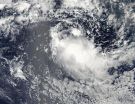(Press-News.org) ANN ARBOR--It's not unusual for people to use war metaphors such as "fight" and "battle" when trying to motivate patients with cancer.
But a new University of Michigan study indicates that using those words can have an unintended negative effect.
David Hauser, a U-M doctoral student in psychology, and colleague Norbert Schwarz of the University of Southern California, found in three studies that exposure to metaphoric language relating cancer to an enemy significantly lessens the extent to which people consider cancer-prevention behaviors.
"Hearing metaphoric utterances is enough to change the way we think about a concept," said Hauser, the study's lead investigator. "When we hear the phrase 'win the battle against cancer,' it forces us to think of cancer as if it's an enemy that we are at war with."
These metaphors emphasize power and taking aggressive actions toward an enemy. However, the bulk of cancer prevention behaviors--such as curbing alcohol intake, salty foods and smoking--involve limitation and restraint. None of them fit with an enemy metaphor that promotes power and aggression, the researchers said.
"Hence, enemy metaphors de-emphasize this subset of beneficial prevention behaviors and hurts people's willingness to engage in them," he said.
In one study, the authors asked participants to list cancer-prevention behaviors they would be willing to undertake. For one group of participants, the request contained metaphors relating cancer to an enemy ("What things would you do to fight against developing cancer?"). For a second group, the request contained no metaphors. The group exposed to the enemy metaphor listed significantly less limitation-related prevention behaviors.
"This suggests that simply seeing war metaphors for cancer diminishes the extent to which these behaviors come to mind," Hauser said.
In another study, 313 participants read one of two health information passages about colorectal cancer. One passage contained metaphors relating cancer to an enemy ("This disease involves an enemy uprising of abnormal cellular growth in the large intestine."), whereas the second passage contained no enemy metaphors.
Participants then rated the extent to which they intended to engage in various prevention, screening and treatment behaviors. Those who read the enemy metaphor passage had less intention to engage in limitation-related prevention behaviors (such as limiting red meat intake or excessive alcohol consumption) than the participants who read the second passage.
"Enemy metaphoric language for cancer diminishes people's intentions for these types of prevention behaviors," Schwarz said. "Importantly, these negative effects of enemy metaphors on prevention behaviors are not accompanied by a positive effect on intentions to undertake screening or treatment behaviors."
War and enemy metaphors are the most common metaphors found in science journalism about cancer, and they pervade public discourse about the disease.
"Fight and battle are actually among the top 10 verbs used to describe cancer," Hauser said. "Constant exposure to even minor metaphorical utterances may be enough to make enemy metaphors for cancer a powerful influence on public health--with unfortunate side-effects."
The findings appear in the January issue of Personality and Social Psychology Bulletin.
INFORMATION:
Researcher: David Hauser
WASHINGTON D.C., Dec. 15, 2014--Cervical cancer is, in many ways, a shining example of how successful the war on cancer can be. Thanks largely to the advent of Pap smear screening, U.S. cervical cancer deaths decreased dramatically, by more than 60 percent, between 1955 and 1992. In the last two decades, better treatment outcomes and more powerful imaging techniques have steadily pushed 5-year survival rates ever higher. The latest weapons in modern medicine's arsenal are two new vaccines that were recently approved by the U.S. Food and Drug Administration for preventing ...
Airports are now subject to careful security surveillance, but many coastal towns and ports are not; they often lack radar installations to keep track of small boats, meaning terrorists could easily use speedboats to approach the coastline and bring explosives on land. Now, researchers at the Fraunhofer Institute for Communication, Information Processing and Ergonomics FKIE in Bonn developed a passive surveillance system for littoral regions based on mobile radio illumination called Passive Coherent Location (PCL). It passively employs the continuous radio signals emitted ...
Leipzig. New flooring in the living environment of pregnant women significantly increases the risk of infants to suffer from respiratory diseases in their first year of life. This is the result of a study carried out by the Helmholtz Centre for Environmental Research (UFZ) and the "St Georg" Municipal Hospital, which demonstrates that exposure to volatile organic compounds in the months before and after birth induces breathing problems in early childhood . The scientists therefore recommend that redecoration should be avoided during pregnancy or in the first year of children's ...
Children who skip main meals are more likely to have excess body fat and an increased cardiometabolic risk already at the age of 6 to 8 years, according to a Finnish study. A higher consumption of sugary drinks, red meat and low-fat margarine and a lower consumption of vegetable oil are also related to a higher cardiometabolic risk. "The more of these factors are present, the higher the risk," says Ms Aino-Maija Eloranta, MHSc, who presented the results in her doctoral thesis at the University of Eastern Finland.
The dietary habits, eating behaviour and dietary determinants ...
ANN ARBOR, Mich. - Most parents agree their children should be ready to move out of the pediatrician's office into adult-focused care by age 18 - but just 30 percent actually make that transition by that age, according to the University of Michigan C.S. Mott Children's Hospital National Poll on Children's Health.
As health care becomes more complex, it's difficult for teens to shift from relying on their parents to taking on their own health care needs.
The C.S. Mott National Poll on Children's Health asked a national sample of parents of adolescents and young adults ...
Cities like Miami are all too familiar with hurricane-related power outages. But a Johns Hopkins University analysis finds climate change will give other major metro areas a lot to worry about in future storms.
Johns Hopkins engineers created a computer model to predict the increasing vulnerability to hurricanes of power grids in major cities on or relatively near the Atlantic and Gulf coasts. They factored historic hurricane information in with plausible scenarios for future storm behavior, given a global rise in average temperatures. With that data, the team could pinpoint ...
Monstrous moonshine, a quirky pattern of the monster group in theoretical math, has a shadow - umbral moonshine. Mathematicians have now proved this insight, known as the Umbral Moonshine Conjecture, offering a formula with potential applications for everything from number theory to geometry to quantum physics.
"We've transformed the statement of the conjecture into something you could test, a finite calculation, and the conjecture proved to be true," says Ken Ono, a mathematician at Emory University. "Umbral moonshine has created a lot of excitement in the world of math ...
By blocking a widespread enzyme, Centenary researchers have shown they can slow down the movement of cells and potentially stop tumours from spreading and growing.
Using a new super-resolution microscope they've been able to see single molecules of the enzyme at work in a liver cancer cell line. Then they've used confocal microscopes to see how disrupting the enzyme slows down living cancer cells.
The enzyme is DPP9 (dipeptidyl peptidase 9) which the researchers at the Centenary Institute and the Sydney Medical School were first to discover and clone, in 1999. Ever ...
Tropical Cyclone Bakung is moving in a westerly direction over the open waters of the Southern Indian Ocean and NASA's Aqua satellite captured an image of the sea storm.
Aqua passed over Bakung on Dec. 12 at 07:35 UTC (2:35 a.m. EST) and the MODIS instrument aboard took a visible image of the storm. The image showed that deeper convection (stronger currents of rising air that form the thunderstorms that make up the tropical cyclone) was occurring around the low-level center of circulation, so the center was not apparent in the MODIS imagery. The bulk of the clouds associated ...
Natural gas from hydraulic fracturing generates income and, done well, can reduce greenhouse gas emissions, air pollution and water use compared to coal and even nuclear energy. However, widespread use of natural gas from fracking could slow the adoption of wind, solar and other renewables and, done poorly, release toxic chemicals into the environment.
Robert Jackson, the Kevin and Michelle Douglas Professor of Environment and Energy at the Stanford School of Earth Sciences, will discuss how to minimize the water and air impacts of fracking and other unconventional energy-extraction ...



